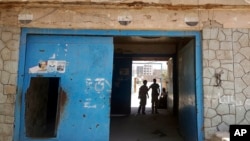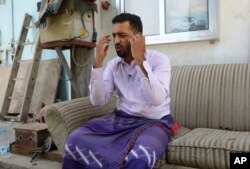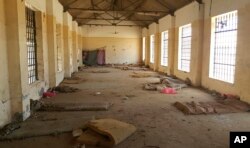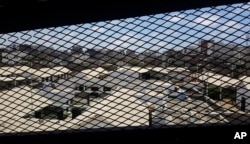The United Arab Emirates has transferred terrorism suspects from Yemen to a secret prison in Assab, Eritrea, according to former detainees and Yemeni officials.
The facility on the Red Sea coast is part of a regional network of prisons in which torture and abuse are rampant, independent investigations by the Associated Press and Human Rights Watch have revealed.
Kristine Beckerle, a researcher for Human Rights Watch, says the UAE and its Yemeni partners view the prisoners as "high-value terrorism suspects [who] are accused of a variety of things related to the UAE efforts against al-Qaida in Yemen."
During a six-month period, HRW researchers visited Yemen to document abuses against detainees.
Beckerle's team discovered some prisoners had been taken to Assab, where the UAE has operated a military base for nearly two years. She said certain details, including how many prisoners the UAE is holding in Eritrea, are difficult to verify due to lack of access to the facilities and denials by UAE and Eritrean officials.
"There's been absolutely no transparency or communication either with the families or with independent monitors," she told VOA. "We've got a whole bunch of prisons that nobody has access to, other than the forces that are running them and detainees that are in them."
Without direct access, HRW relied on interviews with former detainees, family members, lawyers and Yemeni officials. The Associated Press employed similar methods and reached the same conclusions about the scope of the network, the treatment of detainees and the use of the facility in Assab.
Allegations of torture, abuse
Since March 2015, the UAE has been part of a coalition led by Saudi Arabia to defeat Houthi rebels in Yemen. The coalition has also sought to decimate al-Qaida's Yemen branch.
But HRW says the coalition's efforts have a dark side. It accused the UAE of torturing prisoners at informal detention facilities in Yemen and isolating them from the outside world.
The organization documented 49 people including four children who were detained or forcibly disappeared, and says 38 were arrested by security forces backed by the UAE.
Family members of detainees told HRW that their relatives were subjected to beatings with fists or metal objects, electric shocks, canings, forced nudity and threats to family members.
"The UAE was backing Yemeni forces who were implicated in a lot of these abuses," Beckerle said. "And the UAE itself was involved in these detention campaigns, including running some informal detention facilities, and ordering continued detention of people despite release orders, and transferring people potentially out of Yemen to different places for detention."
Official denials
Reached by phone, Eritrea's Minister of Information, Yemane Gebremeskel, denied the accusations and referred to a Twitter message in which he called the reports "patently false."
In the tweet, he pointed out the U.S. has military drone bases in Djibouti and Ethiopia, but made no mention of prisons, Yemen or the UAE.
In a statement, UAE's Ministry of Foreign Affairs dismissed the HRW report as "baseless" and denied claims the UAE military is operating secret prisons in southern Yemen.
"What is stated in the report is completely untrue; it is nothing more than a political game through which the militias and the parties affected by the efforts of the Arab Coalition to fight the terrorist organizations seek to discredit the Coalition, which originally entered Yemen in order to save the people of Yemen," the Ministry said.
The statement made no mention of prisons in Eritrea.
U.S. involvement
The revelations of torture have prompted U.S. Senators John McCain of Arizona and Jack Reed of Rhode Island to call for an investigation into the alleged abuses and any role the United States has played in the interrogations.
The United States has provided logistical and intelligence support to the Saudi-led coalition, working especially closely with the UAE. In its reporting, the AP found U.S. forces were involved in interrogations, but uncovered no evidence they participated in or knew about abuse of detainees.
"It would be illegal for the United States to be involved in or participate in those kinds of actions," said Ryan Goodman, a law professor at New York University and former special counsel to the U.S. Department of Defense.
U.N. special investigators on human rights, terrorism and torture argue a state cannot legally receive intelligence from another state that obtains the information through torture, Goodman said.
The U.S. may also need to reconsider the veracity of whatever intelligence the interrogations produced.
"One could imagine that they would then think, well wait a minute, all the information that we're getting from the UAE could be heavily tainted by having used techniques that they don't think really work," Goodman told VOA.







